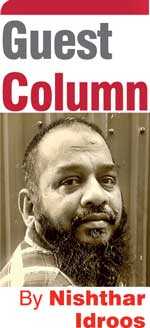Friday Feb 20, 2026
Friday Feb 20, 2026
Monday, 11 January 2021 00:00 - - {{hitsCtrl.values.hits}}

Online radicalisation is an existential threat to most governments (also called cyber-terrorism or extremism or cyber-racism or cyber-hate); it is widespread and has become a major and growing concern to society, governments and law enforcement agencies around the world
The good old professor with an irresistible penchant to talk had given just another grand interview recently. This time to Nadira Gunatilleke of the Sunday Observer under the title ‘Islam is under threat’.  As a close follower, and someone monitoring for gems that frequently transpire from Professor Rohan Gunaratna, I was not disappointed. I managed to detect lies, half-truths and downright fantasies especially in his understanding of Islam, Islamic history, Islamic creed, Islamic theology, Islamic personalities, scholarship, Islamic deviancy and exegesis of the Quran.
As a close follower, and someone monitoring for gems that frequently transpire from Professor Rohan Gunaratna, I was not disappointed. I managed to detect lies, half-truths and downright fantasies especially in his understanding of Islam, Islamic history, Islamic creed, Islamic theology, Islamic personalities, scholarship, Islamic deviancy and exegesis of the Quran.
These individual issues will be dealt with in depth and with certain knowledge, corroboration and scholarship with irrefutable evidence from the two fundamental sources of Islam i.e. Quran and Sunnah. They’re the strengths of this writer. A student of Islam for the last 30 years, having studied the religion under scholars and students of knowledge, there will not be any attempt to hide the truth or paint lily white. Reality, perspective, context and clearing of muddied water will be carried out, Insha Allah.
Nonetheless for his part, with characteristic flamboyance the usually immaculately clad professor dished out quite well and pretentiously at the interview. He must be making plans for his next soon.
Professor Rohan Gunaratna is supposedly a political analyst specialising in international terrorism and former Head of the International Centre for Political Violence and Terrorism Research at Nanyang Technological University in Singapore. I understand the erudite professor is now attached to the defence establishment of Sri Lanka in some capacity. Whilst congratulating the professor it begs to ask a simple question: “Why such a high profile defence assignment for an academic at a time of permanent peace?” This is doubtless a lingering question.
In the past this writer had watched and read many an ominous warning strategically placed by the professor and according to a calendarised plan as alluded to it earlier. This is just the way the global western mainstream media reminds people of 9/11 and its aftermath at strategic moments. Kudos to the professor. Vous faites un excellent travail; just trying to polish my French – (you’re doing an excellent job).
Among many issues the professor talked about was the need to conduct online monitoring, perhaps to arrest radicalisation. That’s an excellent recommendation as most communication and dissemination of pernicious material happens online. Whether it’s extremist Muslims or extremist Buddhist groups this is a reality and should not be overlooked. In recent times extremist Buddhist groups have replicated and had exploited this cheap, convenient medium to good effect or should I say to destructive effect. Online monitoring should do well.
Online radicalisation is an existential threat to most governments (also called cyber-terrorism or extremism or cyber-racism or cyber-hate); it is widespread and has become a major and growing concern to society, governments and law enforcement agencies around the world. Research shows that various platforms on the internet (low barrier to publish content, allows anonymity, provides exposure to millions of users and a potential of a very quick and widespread diffusion of message) such as YouTube (a popular video sharing website), Twitter (an online micro-blogging service), Facebook (a popular social networking website), online discussion forums and blogosphere are being misused for malicious intent.
The whole world knows the white supremacist Brenton Tarrant who killed 51 congregants in a Christchurch mosque in New Zealand. He used the online domain to good effect. The two platforms that had the biggest impact on the shooter’s mindset were YouTube and Facebook. The New Zealand government launched an independent inquiry into the spree killing. The results of that report paint a picture of how the shooter, white supremacist Brenton Tarrant, came to commit such a heinous act. The report specifically found that YouTube played a major role in radicalising the man. “What particularly stood out was the statement that the terrorist made that he was ‘not a frequent commentator on extreme right-wing sites and YouTube was a significant source of information and inspiration’,” said New Zealand Prime Minister Jacinda Ardern while discussing the report. “This is a point I plan to make directly to the leadership of YouTube.”
Tarrant was a fan of the once-prominent far-right YouTuber Stefan Molyneux, as well as other figures on the right such as white nationalists Richard Spencer and Lauren Southern. According to the report, Tarrant even donated money to right-wing organisations and Free-domain Radio, which was created by Molyneux.
YouTube banned both Molyneux and Spencer from the platform. Facebook also played a role in the radicalisation of the Christchurch shooter, according to the report. Tarrant frequently posted Islamophobic rhetoric in far-right Facebook Groups such as The Lads Society Season Two, United Patriots Front, and True Blue Crew. He also spoke about inspiration he pulled from Adolf Hitler’s Mein Kampf on the social network. In one particularly interesting exchange, pointed out by Vice, Tarrant’s mother calls him a ‘neo-Nazi’ in a Facebook message. Tarrant was bothered by this because he worried Facebook’s moderation systems would detect the word and take action against his account.
With the kind of experience the good professor brings to his new assignment coupled with his academic credentials he’ll be in an excellent position to place far reaching recommendations in this area. Even to the extent of sponsoring and enacting new legislation to combat this growing scourge. One country one law must be applied without fear or favour. Let’s hope future policy will translate to healthy laws that will preserve social cohesion and coexistence.
The professor talks about promoting nationalism but does not elaborate. What kind of nationalism is he talking about? What kind of nationalism can take root and flourish in an environment filled with antagonism and mutual suspicion. The contemporary political leadership conspicuously marginalising all minorities with virtual impunity and in total disregard to every known virtue and precept enunciated by the Buddha. The unilateral decision to cremate Muslim COVID-19 victims being just one. What nationalism in such a toxic socio-economic milieu?
Some Buddhists, especially those who subscribe to the purist Theravada strain of the faith, are increasingly convinced they’re under existential threat. This baseless idea is voraciously promoted by partisan politics and some gutter private media always ready to complete the job. Over the past few years, Buddhist mobs have waged deadly attacks against minority Muslim populations. Buddhist nationalist ideologues and politicians are complicit in this enterprise. They are using the spiritual authority of extremist monks to bolster their political base. What kind of nationalism is the professor talking about? Has he given an intellectually enriching reality check of the socio, religious, cultural structures, nuances, vignettes of modern Sri Lanka?
(To be continued.)